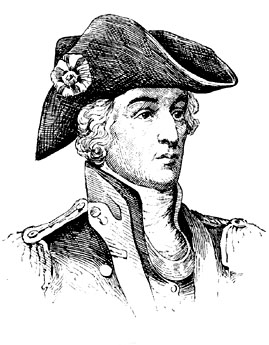| Francis Marion  Born: c. 1732 Born: c. 1732
Birthplace: Winyah, SC
Died: 26-Feb-1795
Location of death: Berkeley County, SC
Cause of death: unspecified
Gender: Male
Race or Ethnicity: White
Sexual orientation: Straight
Occupation: Military Nationality: United States
Executive summary: The Swamp Fox American soldier, born in 1732, probably at Winyah, near Georgetown, South Carolina, of Huguenot ancestry. In 1759 he settled on Pond Bluff plantation near Eutaw Springs, in St. John's parish, Berkeley county. In 1761 he served as a lieutenant under William Moultrie in a campaign against the Cherokees. In 1775 he was a member of the South Carolina Provincial Congress; and on the 21st of June was commissioned captain in the 2nd South Carolina regiment under Moultrie, with whom he served in June 1776 in the defense of Fort Sullivan (Fort Moultrie), in Charleston Harbor. In September 1776 the Continental Congress commissioned him a lieutenant-colonel. In the autumn of 1779 he took part in the siege of Savannah, and early in 1780, under General Benjamin Lincoln, was engaged in drilling militia. After the capture of Charleston (May 12, 1780) and the defeats of General Isaac Huger at Monk's Corner (Berkeley county, South Carolina) and Lt. Col. Abraham Buford at the Waxhaws (near the North Carolina line, in what is now Lancaster county), Marion organized a small troop -- which usually consisted of between 20 and 70 men -- the only force then opposing the British in the state. Governor John Rutledge made him a brigadier-general of state troops, and in August 1780 Marion took command of the scanty militia, ill equipped and ill fed. With this force he was identified for almost all the remainder of the war in a partisan warfare in which he showed himself a singularly able leader of irregular troops. On the 20th of August he captured 150 Maryland prisoners, and about a score of their British guard; and in September and October repeatedly surprised larger bodies of Loyalists or British regulars. Colonel Banastre Tarleton, sent out to capture him, despaired of finding the "old swamp fox", who eluded him by following swamp paths. When General Nathanael Greene took command in the south, Marion and Colonel Henry Lee were ordered in January 1781 to attack Georgetown, but they were unsuccessful. In April, however, they took Fort Watson and in May Fort Motte, and they succeeded in breaking communications between the British posts in the Carolinas. On the 31st of August Marion rescued a small American force hemmed in by Major C. Fraser with 500 British; and for this he received the thanks of Congress. He commanded the right wing under General Greene at Eutaw Springs. In 1782, during his absence as state senator at Jacksonborough, his brigade deteriorated and there was a conspiracy to turn him over to the British. In June of the same year he put down a Loyalist uprising on the banks of the Pedee river; and in August he left his brigade and returned to his plantation. He served several terms in the state Senate, and in 1784, in recognition of his services, was made commander of Fort Johnson, practically a courtesy title with a salary of £500 per annum. He died on his estate on the 27th of February 1795. Marion was small, slight and sickly-looking. As a soldier he was quick, watchful, resourceful and calm, the greatest of partisan leaders in the bitter struggle in the Carolinas.
South Carolina State Senate
South Carolina Hall of Fame 1975
Slaveowners
Requires Flash 7+ and Javascript.
Do you know something we don't?
Submit a correction or make a comment about this profile
Copyright ©2019 Soylent Communications
|